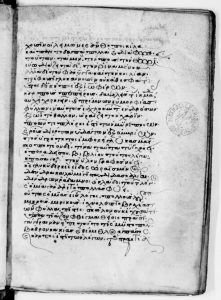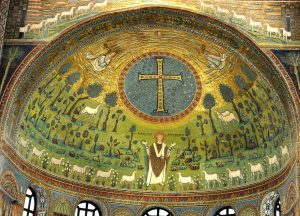Today, on the first day of Spring, we celebrate World Poetry Day! The DBBE is a huge treasury of poems that were written down centuries ago in the margins of medieval manuscripts. What better opportunity to put another one of those fascinating book epigrams in the spotlight? 😍
This year, we particularly feel the need to remember what World Poetry Day is all about: seeking beauty. The verses below are part of an epigram that compares the book it introduces to a beautiful garden full of blossoming flowers and trees. 🌸🌳 Books can and should be an oasis of peace.

✒️ Ἔχουσιν οἱ λειμῶνες ἄνθη ποικίλα
καὶ παντοδαπά, πολλὰ καὶ διάφορα·
τούτων τὰ μὲν τέρπουσι τὴν θεωρίαν,
εὐωδιάζει τὰ δὲ τὴν ῥῖνα μόνην,
ἄλλα δὲ τὸν φάρυγγα καὶ τὴν κοιλίαν
τρέφουσι, γλυκαίνουσιν οὐκ ἀθεσφάτως.
Οὗτος δ’ ὁ κῆπος, ἐξ Ἰωάννου φέρων
καρποὺς πεπείρους, δαψιλεῖς τὰς ἰκμάδας,
αὐχεῖ χορηγεῖν καὶ πρέμνων εὐμορφίας
φύλλων ἐν αὐτοῖς εὐχλοούντων ἐνδρόσων,
ἐξ ὧν τὸ θάλλον ὡραΐζει τὴν χάριν
📖 The meadows have various flowers
from different origin, many and diverse.
Some of them are joyful to look at,
some have only a pleasant perfume,
others feed and sweeten divinely
the throat and the stomach.
This garden, bearing fruit from John,
ripe and full of juice,
is proud to provide also well-shaped trees
with green leaves covered with dew,
whose blossoming beautifies the grace.
🌐 https://www.dbbe.ugent.be/types/3069
These verses open a long poem of 102 (!) verses, the first in a poetic cycle of four metrical paratexts on John Klimax and his ‘Ladder of Divine Ascent’, written at the end of the sixth century or in the first half of the seventh century. The epigram is transmitted in four manuscripts and functions as a spiritual preparation to the ‘Ladder’. In this epigram, the book is metaphorically described as a garden: the trees are the moral lessons expressed by the words of Klimax, i.e. the branches of the tree. An extended allegory follows, evoking an idyllic place where birds dwell under a rising and shining sun.
